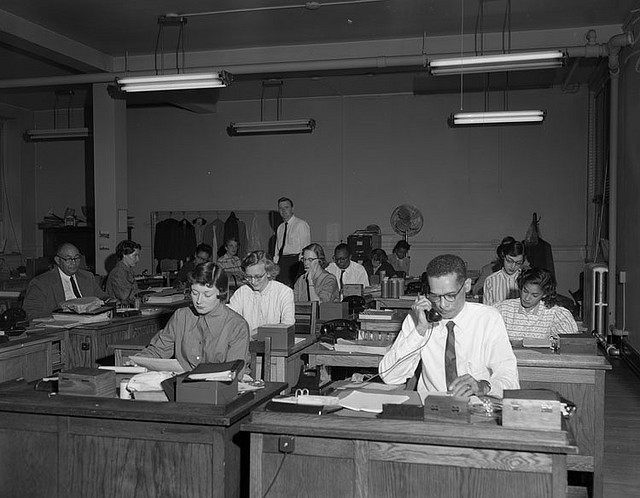
In a Medium piece about how to be polite, writer Paul Ford says that one of the best tricks for fighting awkward conversations at parties is to wait as long as possible to ask someone what they do for work. Then, when the conversation lulls, you have the perfect question — and, regardless of what they do, the perfect response.
“Just ask the other person what they do, and right after they tell you, say: ‘Wow. That sounds hard.'” says Ford, who explains that “nearly everyone in the world believes their job to be difficult,” which means an empathetic response like this can help win people over and make you seem likable.
If, in fact, we believe our jobs are hard as Ford says, then we also theoretically should take a great deal of pride in the fact that we are competent to do them. And, statistically, we seem to. In fact, we get our sense of identity from our work; if you live in the United States, according to a Gallup poll, you’re more likely to believe that your job defines you than that it’s just a thing you do for money.
Why, then, do so many people work jobs they loathe?
Another Gallup poll, this one from 2013, famously found that a full 70% of workers in the United States are either mildly disengaged or actively disengaged from their work. Which means that while most people feel that their jobs define them, that definition is one they aren’t really that enthused about. The main reason they aren’t engaged or happy with their jobs?
The boss.
“Of the approximately 100 million people in America who hold full-time jobs, 30 million (30%) are engaged and inspired at work, so we can assume they have a great boss. At the other end of the spectrum are roughly 20 million (20%) employees who are actively disengaged. These employees, who have bosses from hell that make them miserable, roam the halls spreading discontent. The other 50 million (50%) American workers are not engaged. They’re just kind of present, but not inspired by their work or their managers,” writes Gallup CEO Jim Clifton in the introduction to the polling firm’s State of the American Workplace report.
“Gallup has found that managers who focus on their employees’ strengths can practically eliminate active disengagement,” according to the study.
And while engagement may not seem like a high priority for managers and business owners, consider the bottom line: Gallup estimates that active disengagement costs the U.S. between $450 billion and $550 billion per year.
If you’re a manager, the main message is this: Your employees want to be good at their jobs, and they want to identify as a worker — but if you’re not helping them reach their full potential, you’re costing yourself money.
But what if you’re an unhappy employee? Should you stay with a job/boss that gives you a sense of self — even if you’re not actively engaged or thriving in that job? Or do you throw in the towel at your current position and hunt down your dream career, which can often feel scary and may even lead to the loss of important quality-of-life measurements, like health insurance?
The first step is to establish a sense of work-life balance. If quitting your day job just isn’t feasible at the moment, or if it’s really not so bad and leaves you the time and energy to make your creative side-project until that becomes a full-time gig, it’s important to set clear boundaries between yourself and your work.
“Start with one or two things at a time,” says lawyer, author, and photographer Rachel Brenke, “You don’t have to do it all at once — little adjustments here and there may lead to balance.” Small acts, like not working from home in the evenings, or setting aside time to do the things you love, can help separate you from your work — which is important if you don’t like your work.
Another potential solution: Find a new boss. In many larger companies, lateral moves are possible, which could put you in touch with a manager who’s a little more in step with your learning and working styles.
Education may be another key to work satisfaction; Gallup found that workers with college educations were more likely to find a positive sense of identity in their work. However, you don’t necessarily need to go back to school — taking online classes, classes at a nearby community college, or even just attending free seminars or talks in your area can help you build the skills you need to find a job that’s more in line with the kind of work you’d like to be doing.
And, if nothing else, start plotting how to find work that makes you more happy. Career coach Michelle Ward’s concrete steps to solve the problem of a job you hate can help you sever those ties in a way that’s financially responsible and also sanity-saving.
If you’re going to be your job, you may as well be a job you love. And hey, maybe you’re your own best boss.


